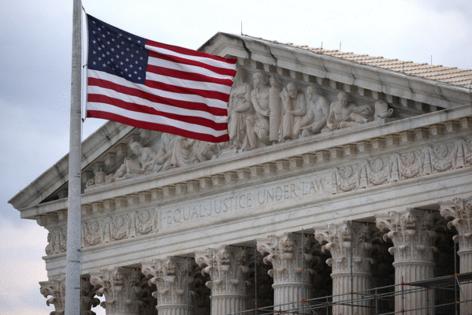Supreme Court sees a free-speech problem with laws that ban 'conversion therapy' for minors
Published in News & Features
WASHINGTON — The Supreme Court justices on Tuesday heard a free-speech challenge to state laws against "conversion therapy" and sounded likely to rule the measures violate the 1st Amendment.
California and more than 20 other states have adopted laws to forbid licensed counselors from urging or encouraging gay or transgender teens to change their sexual orientation or gender identity.
The laws were adopted in reaction to a history of dangerous and discredited practices, including treatments that induced nausea and vomiting or administered electric shocks.
Lawmakers and medical experts said such efforts to "cure" LGBTQ+ teens were cruel and ineffective and caused lasting harm. But these "talk therapy" laws have been challenged by a number of Christian counselors who believe they can help young people who want to talk about their feelings and their sexual identity.
The court on Tuesday heard an appeal from Kaley Chiles, a counselor from Colorado Springs, Colo. She says she is an evangelical Christian, but does not seek to "cure" young people of a same-sex attraction or change their gender identity.
She sued, alleging the state law seeks to "censor" her conversations and threatens her with punishment.
She lost before a federal judge and a U.S. appeals court, both of whom said the state has the authority to regulate the practice of medicine and to prevent substandard health care.
But the Supreme Court voted to hear her appeal.
"This law bans voluntary conversations, censoring widely held views on debated moral, religious and scientific questions," her attorney James Campbell said in his opening.
The justices, both conservative and liberal, appeared to agree the Colorado law violated the 1st Amendment guarantee of free speech.
"What's being regulated here is pure speech," said Justice Samuel A. Alito Jr.
Moreover, he said, the state law enforces a double standard. It would punish a licensed counselor who agrees to talk to a teenage client who wants to "overcome same-sex attractions," but not if she encourages the teen to accept or affirm those attractions.
Justice Elena Kagan said she too saw a potential 1st Amendment violation. And Justice Sonia Sotomayor said there was less evidence that talk therapy alone has caused real harm.
She also questioned whether the Colorado counselor had standing because she was not charged with violating the law. But none of the others endorsed that idea.
In defense of the law, Colorado state solicitor Shannon Stevenson said the law applies only to licensed counselors. It does not extend to others, including religious ministers.
The practice of medical care "is a heavily regulated area. A doctor doesn't have a 1st Amendment right to give wrong advice to patients," she said.
But most of the justices said the 1st Amendment does not permit the state to punish counselors because their views do not align with the state's.
What about the era when "homosexuality was professionally considered to be a mental health disorder?" asked Justice Neil M. Gorsuch. Could the state by law have punished a "regulated licensed professional for affirming homosexuality?"
The state's attorney agreed that may have been possible based on the standard of care at the time.
Justice Amy Coney Barrett and others suggested counselors could still face a medical malpractice lawsuit, even if the court rules the state law violates the 1st Amendment.
The Trump administration joined the case on the side of the Colorado counselor and urged the court to rule for her on free-speech grounds.
In 2012, California was the first state to adopt a ban on conversion therapy for minors. In signing the measure, Gov. Edmund G. Brown Jr. referred to such therapy as "junk science" that led to depression and suicide.
The measure was challenged on free-speech grounds, but the 9th Circuit Court of Appeals upheld it on the basis that it regulated medical treatment by professionals.
But the 1st Amendment has been used repeatedly to challenge laws involving LGBTQ+ people.
Twice in recent years, the Supreme Court has ruled for Colorado business owners who objected to providing service for a same-sex wedding.
One designed custom wedding cakes, and the other designed websites for weddings. They sued seeking an exemption from the state civil rights law that required businesses to provide equal service to customers without regard to sexual orientation.
They were represented by the Alliance Defending Freedom, a Christian legal group that also represents Chiles.
In June, the court's conservative majority ruled for Tennessee and upheld red-state laws that prohibit the use of puberty blockers and sex hormones for transgender teens.
The court's opinion said it was deferring to the states because there was sharp debate over the proper treatment for young people with gender dysphoria.
The case heard Tuesday — Chiles vs. Salazar — was the first of two this term involving LGBTQ+ rights. In December, the justices will hear arguments on whether West Virginia may bar transgender school athletes from competing on girls' sports teams.
_____
©2025 Los Angeles Times. Visit latimes.com. Distributed by Tribune Content Agency, LLC.







Comments